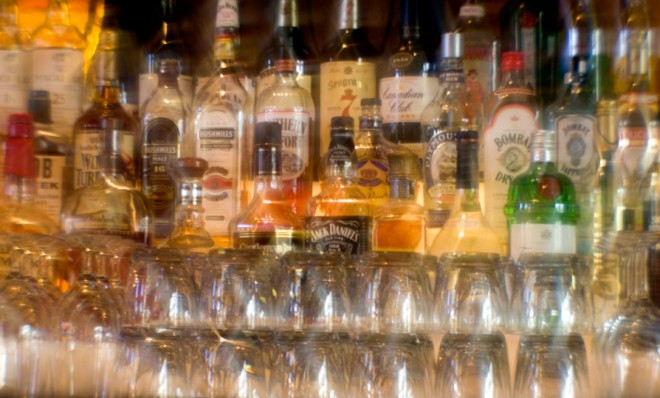Operation Swill: New Jersey's top-shelf liquor scam
The Garden State's liquor regulator just busted 29 bars and restaurants for passing off hooch — or worse — as high-end booze


A free daily email with the biggest news stories of the day – and the best features from TheWeek.com
You are now subscribed
Your newsletter sign-up was successful
Americans don't always have the warmest feelings about government, but New Jersey regulators just gave good-goverment types everywhere a reason to cheer. Also, anyone who enjoys a mixed drink or dram of Scotch. This week, 100 investigators swarmed 29 bars and restaurants across New Jersey for allegedly passing off cheap booze — or worse — as top-shelf liquor.
They called the sting, beautifully, Operation Swill.
This week's action was the result of a year-long undercover investigation, in which agents from the New Jersey Division of Alcoholic Beverage Control (ABC) used a new instrument — the True Spirit Authenticator — to analyze alcohol samples quickly and cheaply. Early this year, agents visited 63 establishments and ordered straight shots of premium brands of liquor, then slipped off with a total of 150 samples; 30 were not as advertised.
The Week
Escape your echo chamber. Get the facts behind the news, plus analysis from multiple perspectives.

Sign up for The Week's Free Newsletters
From our morning news briefing to a weekly Good News Newsletter, get the best of The Week delivered directly to your inbox.
From our morning news briefing to a weekly Good News Newsletter, get the best of The Week delivered directly to your inbox.
Most of the liquid malfeasance involved putting well hooch in top-shelf bottles, but in some instances patrons really didn't get what they paid for. "In one case, a New Jersey bar allegedly mixed rubbing alcohol with caramel food coloring and served it as Scotch," says Brent Johnson at The New Jersey Star-Ledger. "In another, a bar is accused of pouring dirty water into an empty bottle and passing it off as liquor."
ABC Director Michael Halfacre said Thursday that his division routinely checks for brand-switching, but this ramped-up operation was sparked by a spike in customer complaints and a confidential tipster. More raids are possible, he added. "This is essentially a wake-up call to the less altruistic operators in the industry that they need to get their act together."
According to Halfacre, almost half of the "less altruistic operators" busted this week — 13 — were TGI Fridays. "What these 29 establishments have allegedly done threatens the integrity of the alcoholic beverage industry as a whole," state Attorney General Jeffrey Chiesa said Thursday. "This alleged scheme is a dishonest ruse to increase profits, and it is a slap in the face of the consumer. The consumer should have the peace of mind to know that when they pay for something, they get exactly what they paid for, no exceptions." (Watch a video of his remarks below.)
Many bar patrons will consider this a crime, but Chiesa says this is not a criminal investigation. Agents seized 1,000 bottles of liquor and five funnels for testing. If the establishments are found guilty, they could lose their liquor license. Bartenders won't be punished, though they could presumably lose their jobs.
A free daily email with the biggest news stories of the day – and the best features from TheWeek.com
All 13 TGI Fridays franchises — and 57 others nationwide — are owned by New Jersey's Briad Group. The national company, in Texas, says it is appalled by the allegations, and Briad called them "troubling and surprising to us," promising its own investigation. If you live in or near New Jersey, you can find a list of the raided bars and restaurants here.
But even if you don't live in the Garden State, this should worry you, says avowed tippler Justin Peters at Slate. "If the bait-and-switch is happening in New Jersey, it's happening elsewhere, too, quite possibly in the low joints where I spend an alarming amount of my time." Peters offers some advice for anyone worried about being duped by the bartender. Some of it is common sense:
Use your senses. Sometimes it's hard to differentiate between top-shelf liquors and marginal brands... But other times there's a real difference, and you can usually tell by using your senses. For example, taste. Ask the bartender for a sip of that Dewar's before he dilutes it with soda. It if tastes unnaturally harsh, it might be a fake. Other senses can come in handy, too. Do the colors look weird? Does it smell like paint thinner? [Slate]
Other tips are specific to this investigation — like avoid TGI Fridays.
Peter has worked as a news and culture writer and editor at The Week since the site's launch in 2008. He covers politics, world affairs, religion and cultural currents. His journalism career began as a copy editor at a financial newswire and has included editorial positions at The New York Times Magazine, Facts on File, and Oregon State University.
-
 Will increasing tensions with Iran boil over into war?
Will increasing tensions with Iran boil over into war?Today’s Big Question President Donald Trump has recently been threatening the country
-
 Corruption: The spy sheikh and the president
Corruption: The spy sheikh and the presidentFeature Trump is at the center of another scandal
-
 Putin’s shadow war
Putin’s shadow warFeature The Kremlin is waging a campaign of sabotage and subversion against Ukraine’s allies in the West
